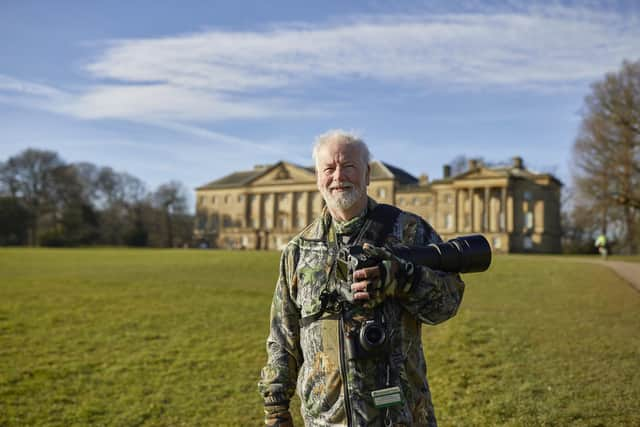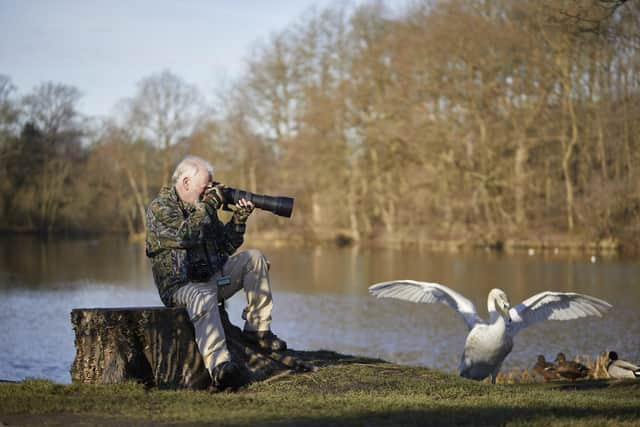'It changed my life' - Wildlife photographer says being out in nature with his camera transformed his mental health
At his lowest point, Paul, now 70, couldn’t bring himself to leave the house for eight weeks, not even venturing outdoors to take rubbish to the bin. A single photograph changed his life. That image, of a bee flying into a foxglove in the garden of his home in Hemsworth, was a turning point. “Something said to me ‘wildlife - make that your chosen thing’,” Paul reflects. “I thought, ‘you can do this and won’t it be wonderful?’”
For six years now, Paul has been a volunteer photographer for the National Trust at Nostell in Wakefield. His knack for connecting with wildlife has enabled him to capture nature in its most majestic form – and behind the lens, it has taken Paul on an “amazing and emotional” transformative journey. “For me the pictures are priceless,” he says. “For what they do for my mental health, no one can afford them.”
Advertisement
Hide AdAdvertisement
Hide AdPaul has suffered with depression and panic attacks since the mid-1990s, after being involved in a car accident. He first became aware something was wrong when his wife asked him to pick up a loaf of bread one morning. It took him more than two hours – and countless attempts of leaving the house – before he finally reached the shop a ten minute walk away. “I got home, put the bread in the cupboard, and I remember sinking down, curling into a ball and sobbing my heart out,” he recalls.


Paul began taking antidepressants, but doctors also recommended fresh air and exercise. At his lowest though, Paul found himself unable to leave the house. He didn’t know it then, but he needed an incentive –and that would come in the form of a camera. He spotted it in an Argos sale whilst browsing the internet one evening. After three hours of internal debate, he clicked purchase. But at first, it didn’t help.
“I just went around the house taking pictures of everything and anything and when I put the photographs on the computer, I couldn’t even recognise what they were. So I put the camera in a cupboard and said to myself, ‘I can’t do this, this is something else for me to fail at’.
“Then one morning I saw bees flying around the foxgloves in the garden. A voice in my head said ‘You need to get outside’. I got the camera out, took six steps, then panic set in...I was like a man possessed trying to take pictures. Looking back at them, everything is blurred – the foxgloves, the bees, the walls… I realised it was because I was so frantic and I was turning round to check the door was open so I could get in if I needed to."
Advertisement
Hide AdAdvertisement
Hide AdHe was just about to give up when he caught that single life-changing photograph, as he perched on garden furniture, slowing down enough to stop the blurring. Once Paul felt he’d photographed everything in his garden, his next step was to venture out to Nostell, where wife Lynda worked in the café. One of the early photographs he took there was of a swan with its wings outstretched. “When I looked at that picture at home afterwards I remember thinking you were right to go out and spread your wings,” he says.


After sending one of his images at Nostell into the National Trust, Paul was invited to become one of the trust’s first volunteer photographers. He has photographed all kinds of wildlife, including an elusive water vole at Malham Tarn and a baby coot venturing out of its nest for the first time. His pictures have appeared all over the world, but he always comes back to the swans at Nostell.
“The swans either recognise me or the camera,” says Paul. “There’s something that means I’m able to go to the lake and they will even bring their cygnets out of the water for me. It’s like the mum is saying ‘Do you want some pictures then?’”
Paul, known as Paul C Dunn for his pictures, still has struggles with his mental health but he has overcome not being able to get out. He describes his camera as his comfort blanket, one of the things he uses to improve his wellbeing. “It’s been enormous for me,” he says.
Advertisement
Hide AdAdvertisement
Hide Ad“Somebody once asked me if I’d recommend photography for people with depression but the answer is no because that’s not what was recommended for me. What was recommended for me was fresh air and exercise and I can highly recommend that. What the camera gave me was a reason to go out...I know how difficult it can be, sometimes you need an incentive and photography gave me that.”
